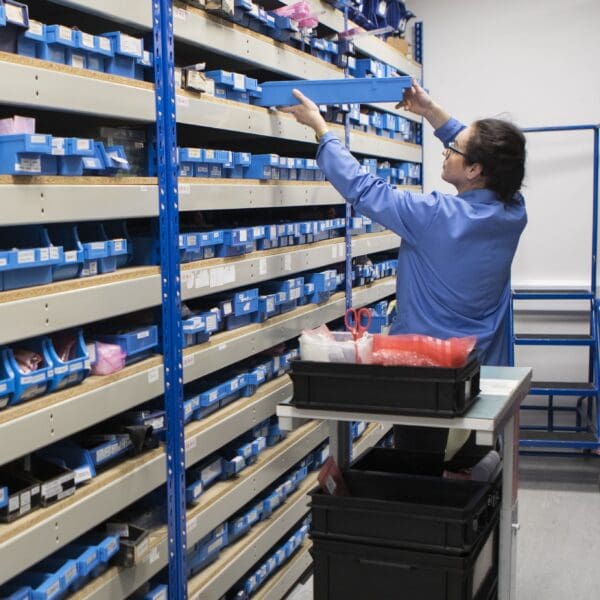
ETL RF over Fibre
Delivering dependable RF signals over long distances


GENUS StingRay
Greater flexibility for optimised performance
ETL’s GENUS StingRay RF over Fibre carry a comprehensive range of frequency bands including C-Band links operating between 500MHz to 6.7 GHz.
The StingRay system offers manual gain control (MGC) as well as fixed gain and automatic gain control (AGC) modes, providing operators with greater flexibility while setting links up for optimised system performance in satellite teleports.

Modular IF to
C-band fibre links

Short distance, CWDM & DWDM

Latest generation using SNMPv3

Secure remote control & monitoring
The GENUS habitat offers improved security aspects (SNMPv3 and HTTPS) while maintaining an industry-leading module density, with 17 module slots available in the 1U chassis. These upgrades make GENUS a highly secure and efficient solution for demanding applications.

Save rack space & cost
The GENUS chassis integrates StingRay RF over Fibre, ETL’s Falcon frequency converters, ALTO amplifiers, switches, splitters, and small RF matrices/routers, all within a single indoor or outdoor chassis. This consolidation reduces costs, saves rack space, and enhances system resilience.
Applications
CWDM or DWDM – What’s the difference?
CWDM Up to 50 km
ETL’s StingRay CWDM RF over Fibre products are designed for high-density signal transmission over long distances, up to 50 km.
CWDM, or Coarse Wavelength Division Multiplexing, is a cost-effective method for sending multiple wavelengths on a single optical fibre link without the need for optical amplification, typically over distances less than 50 km. The system supports up to 16 optical channels.
or
DWDM Up to 500 km
ETL’s Stingray DWDM RF over Fibre products boost network capacity by transmitting multiple high-bandwidth signals simultaneously over long distances, up to 500 km.
DWDM, or Dense Wavelength Division Multiplexing, modules enable fibre links to extend up to 500 km and beyond, using optical amplification (EDFA). This technology supports up to forty wavelengths on a single fibre cable, allowing for extremely high-density transmission.
Learn more about the difference between CWDM and DWDM
GENUS Chassis Compatible
The smart chassis concept allows for the housing of multiple RF modules within the same shelf, providing space savings, reduced costs, and increased rack space efficiency.
All of the above modules can be housed in outdoor units.
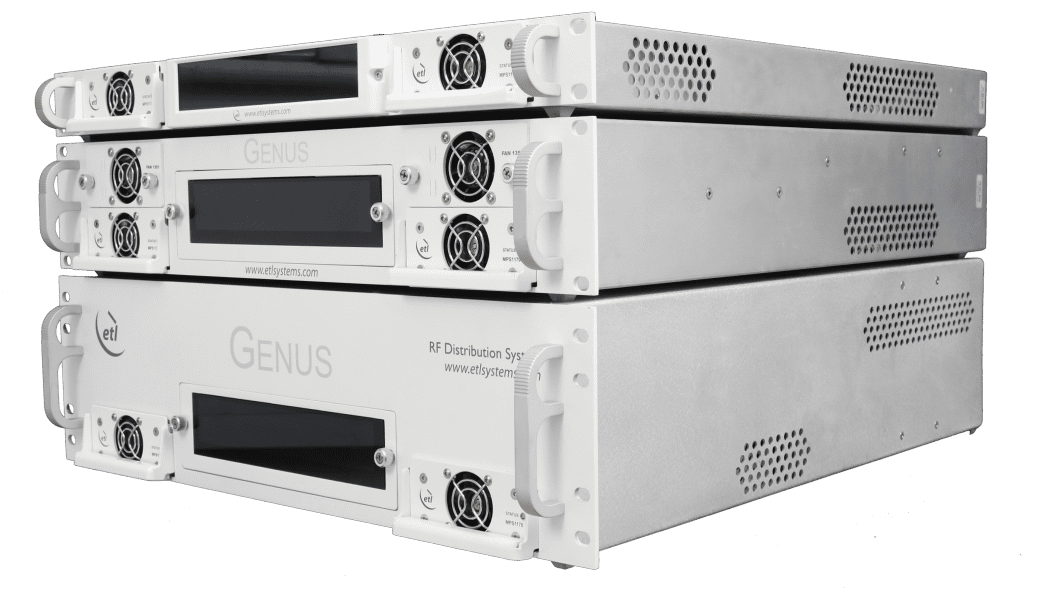
8 Fibre Modules Available
for Short, Medium (CWDM) or Long Distance (DWDM) Links
ETL’s L-Band RF over Fibre link (850-2450 MHz) is designed to cover extensive distances, providing robust signal transmission up to 10 km or up to 50 km when utilising Coarse Wavelength Division Multiplexing (CWDM) technology. For even greater distances, ETL offers a Long-Distance Dense Wavelength Division Multiplexing (DWDM) system capable of reaching up to 500 km. This advanced fibre link solution ensures high-quality, long-range signal distribution. It is ideal for a wide range of satellite communication applications that require reliable and efficient RF signal routing over substantial distances.
1U or 2U Module Sizes
ETL Systems’ GENUS StingRay RF over Fibre modules offer versatile solutions in either 1U or 2U configurations, accommodating diverse deployment needs. These modules support a wide spectrum of frequency bands, including the C-Band links spanning from 500MHz to 6.7 GHz. Designed to enhance signal transmission efficiency, the GENUS StingRay modules are pivotal in critical communication infrastructures where reliability and performance are paramount. Whether used in satellite ground stations, broadcast facilities, or military applications, these RF over Fibre solutions provide robust connectivity solutions that meet the demanding requirements of modern telecommunications and broadcast industries.
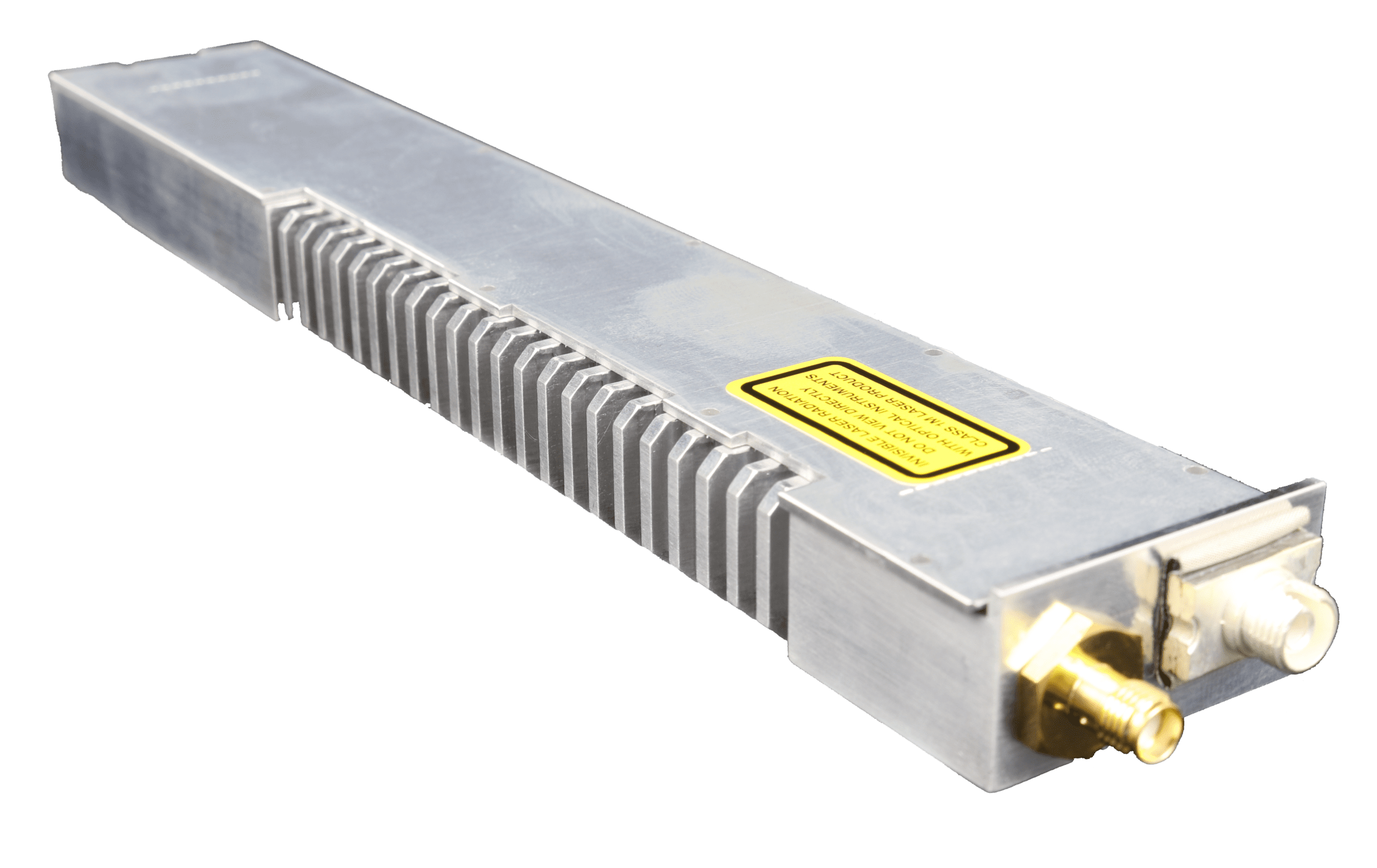
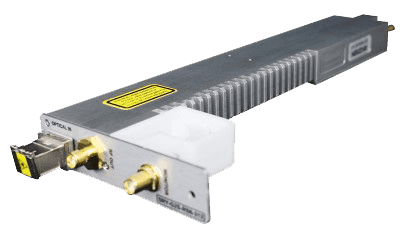
Hot Swappable Modules
Hot swappable modules offer significant benefits in ground segment systems by enabling the replacement or upgrade of hardware components without interrupting service or powering down equipment.
This feature is crucial for maintaining continuous operation, particularly in mission-critical environments such as satellite communication, where downtime can lead to data loss or disruption of services. Hot swappability ensures swift and efficient maintenance, reducing repair times and operational costs while enhancing system reliability and uptime. Additionally, it allows for easy scalability and flexibility, enabling ground stations to adapt quickly to changing technology and capacity requirements.
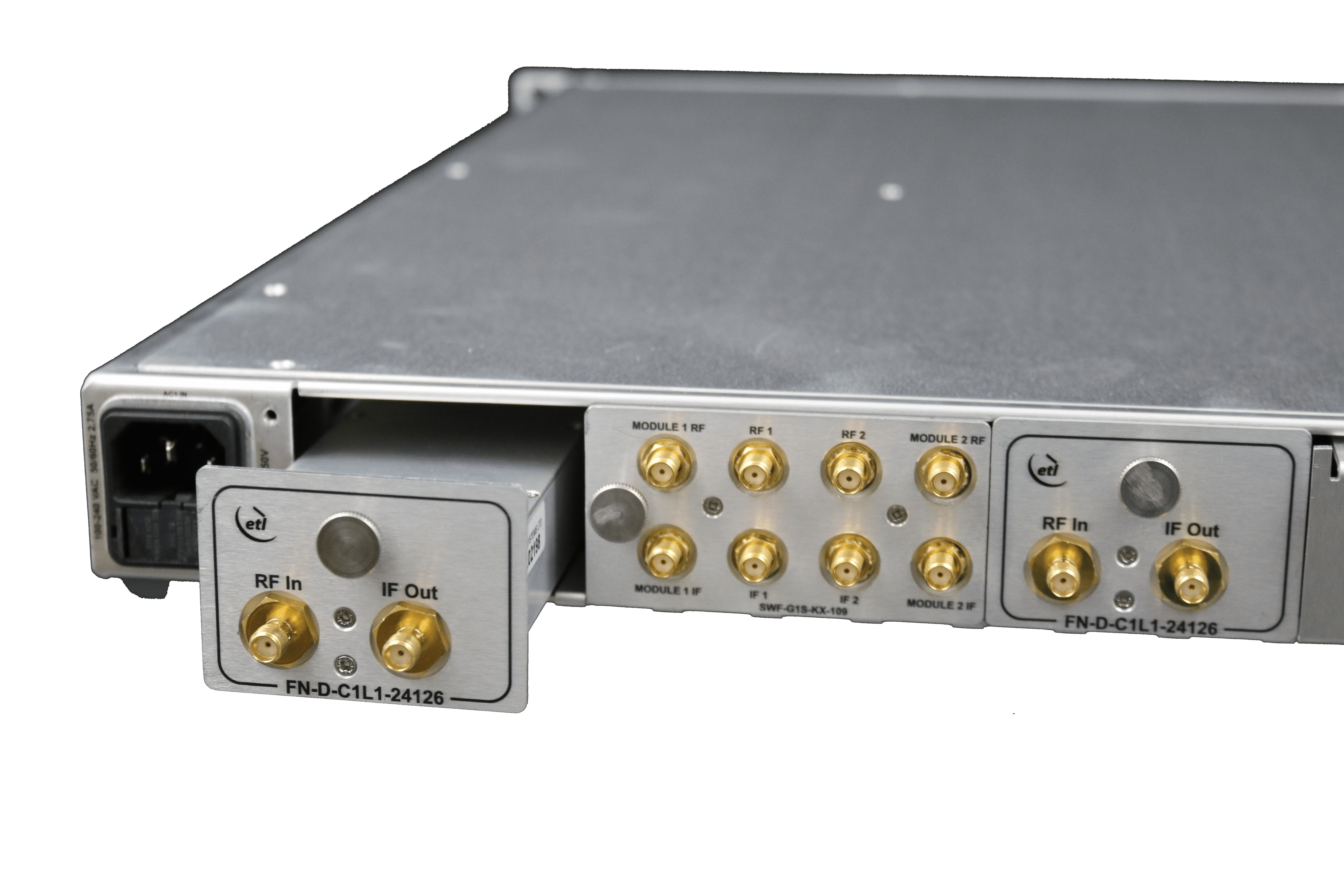
Secure protocols with SNMPv3 and HTTPS
Implementing secure protocols like SNMPv3 and HTTPS in network management provides substantial benefits by ensuring the safety and integrity of data communications. SNMPv3 (Simple Network Management Protocol version 3) enhances security through robust authentication and encryption mechanisms, protecting network devices from unauthorised access and tampering. It also supports fine-grained access control, allowing administrators to precisely manage user permissions.

Meanwhile, HTTPS (Hypertext Transfer Protocol Secure) encrypts data transmitted over the internet, safeguarding sensitive information from interception and attacks during remote access and control of network devices. Together, these protocols help protect critical infrastructure from cyber threats, enhance compliance with security standards, and foster trust in network management practices. By securing both local and remote communication channels, they provide a resilient foundation for reliable and secure operations in modern networking environments.
Local & Remote control & monitoring
Local and remote control and monitoring capabilities provide essential advantages in managing complex systems and networks. Locally, operators can directly oversee equipment status, troubleshoot issues promptly, and make real-time adjustments to optimise performance. This immediate access is critical for maintaining operational continuity and responding swiftly to changing conditions or emergencies.

On the other hand, remote control and monitoring extend these capabilities beyond physical proximity, allowing administrators to manage devices and systems from virtually anywhere. This flexibility enhances operational efficiency by reducing the need for on-site interventions and enabling proactive maintenance and upgrades. Additionally, remote monitoring provides insights into long-term performance trends, enabling data-driven decision-making and predictive maintenance strategies. Overall, the combination of local and remote control and monitoring empowers organisations to maximise uptime, ensure regulatory compliance, and deliver reliable services to end-users.
3-year warranty as standard
ETL offers a significant benefit to customers with a comprehensive three-year warranty on their products. This warranty underscores their commitment to quality and reliability, providing peace of mind to users that their investment is protected against manufacturing defects or failures. The three-year coverage period is a testament to ETL’s confidence in the durability and performance of their products, reflecting their rigorous testing and quality assurance processes. This warranty not only assures customers of immediate support and replacement if needed but also reinforces ETL’s dedication to long-term customer satisfaction and support throughout the lifecycle of their products.

Need help selecting the right RF Solution for your project?
Only a selection of our products are listed on the site. If you can’t find what you’re looking for or have specific requirements, our team is here to assist you in finding the perfect solution.
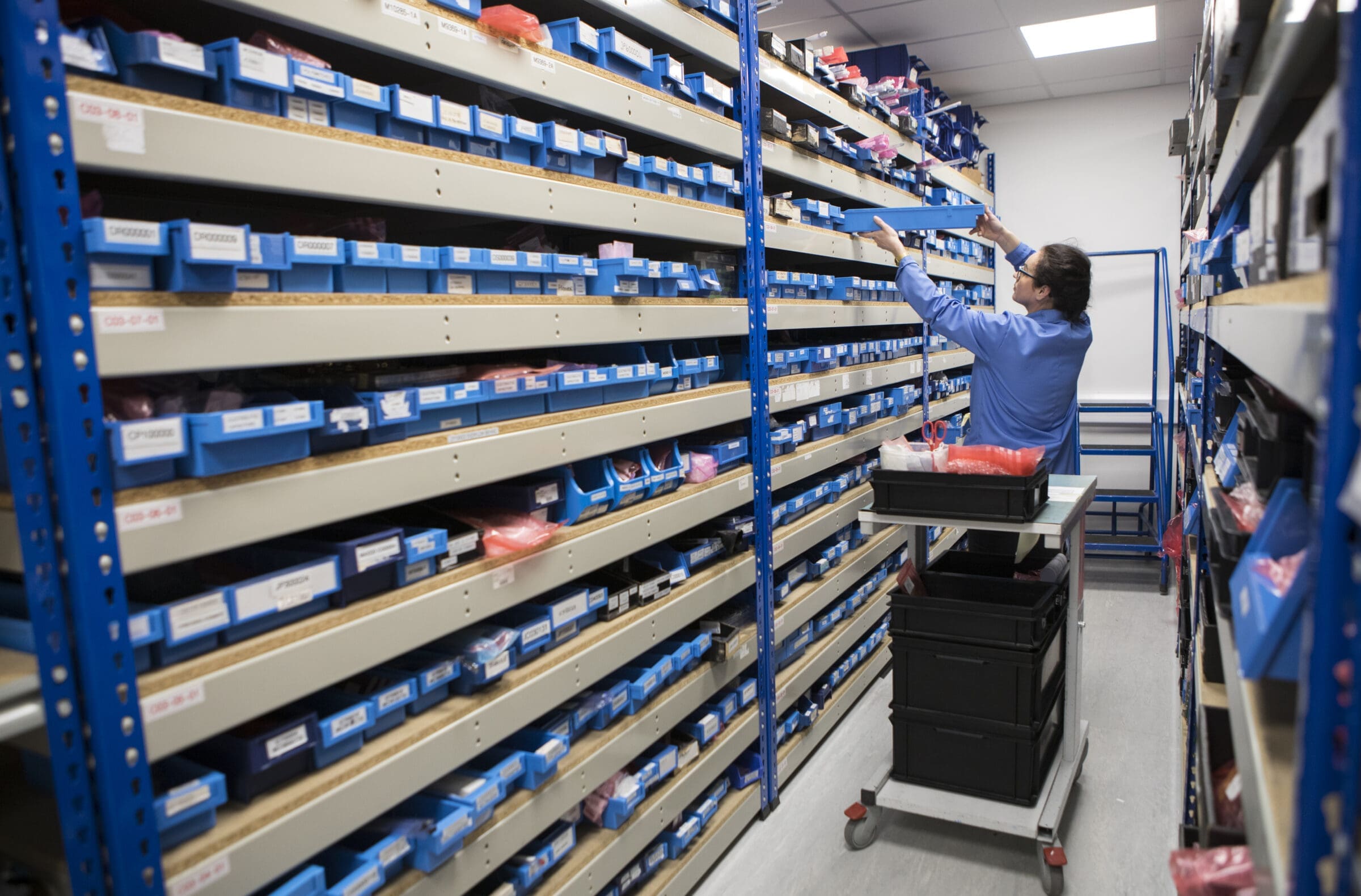
Short Fibre Links
L-Band 850-2450 MHz
ETL’s L-Band RF over Fibre link (850-2450 MHz) covers distances up to 10 km.
- AGC, MGC and Fixed Gain modes
- 13/18 V and 22 kHz tone LNB control
- Options for dual modules or RF monitor ports
- 50 and 75 ohm
- Hot Swap
- Superior RF specifications and Isolation
- Redundancy options from 1+1 up to 4+2 redundancy
- Secure protocols with SNMPv3 and HTTPS
- Local & Remote control & monitoring via RJ45 Ethernet port and web browser interface
S-Band 500-3150 MHz
ETL’s S-Band RF over Fibre link (500-3150 MHz) covers distances up to 10 km.
- AGC, MGC and Fixed Gain modes
- 13/18 V and 22 kHz tone LNB control
- Hot swap
- 50 and 75 ohm
- Superior RF specifications and Isolation
- Redundancy options from 1+1 up to 4+2 redundancy
- Options for dual modules or RF monitor ports
- Secure protocols with SNMPv3 and HTTPS
- Local & Remote control & monitoring via RJ45 Ethernet port and web browser interface
- 3-year warranty as standard
Wideband 50-3150 MHz
ETL’s wideband RF over Fibre link (50-3150 MHz) covers distances up to 10 km.
- AGC, MGC and Fixed Gain modes
- 13/18 V and 22 kHz tone LNB control
- Hot swap
- 50 and 75 ohm
- Superior RF specifications and Isolation
- Redundancy options from 1+1 up to 4+2 redundancy
- Option for RF monitor port
- Secure protocols with SNMPv3 and HTTPS
- Local & Remote control & monitoring via RJ45 Ethernet port and web browser interface
- 3-year warranty as standard
C-Band 500-6725 MHz
ETL’s C-Band RF over Fibre link (500-6725 MHz) covers distances up to 10 km.
- AGC, MGC and Fixed Gain modes
- 13/18 V and 22 kHz tone LNB control
- Hot swap
- Superior RF specifications and Isolation
- Secure protocols with SNMPv3 and HTTPS
- Local & Remote control & monitoring via RJ45 Ethernet port and web browser interface
- 3-year warranty as standard
Downloads
10 MHz Reference over fibre
ETL’s 10 MHz Reference over fibre covers distances up to 10 km.
- AGC, MGC and Fixed Gain modes
- Hot swap
- Enhanced phase noise
- Option for 1+1 redundancy
- Option for RF monitor port
- Secure protocols with SNMPv3 and HTTPS
- Local & Remote control & monitoring via RJ45 Ethernet port and web browser interface
- 3-year warranty as standard
Ethernet over Fibre
ETL’s Ethernet over fibre covers distances up to 10 km.
- Features 2 x Gigabit Ethernet SFP module slots and 2 x 10/100/1000BASE-T RJ45 ports
- Hot swap
- Secure protocols with SNMPv3 and HTTPS
- Local & Remote control & monitoring via RJ45 Ethernet port and web browser interface
- 3-year warranty as standard
Timing Signals over Fibre
ETL’s low-phase noise optical modules convert PPS & IRIG DCLS TTL input to optical for timing applications.
- 1PPS to 1MPPS and IRIG DCLS
- For links up to 10km
- Hot swap
- Secure protocols with SNMPv3 and HTTPS
- Local & Remote control & monitoring via RJ45 Ethernet port and web browser interface
- 3-year warranty as standard
Downloads
VSAT/ Ruggedised RF over Fibre
ETL’s compact RF over fibre system covering 50 to 3150 MHz for links up to 10km, with ruggedised ODU and IDU options for durable, space-saving solutions.
- Wide range of operating frequencies
- For links up to 10km
- 10MHz reference signal input for up and downlinks
- Variable gain on RX and TX models for enhanced signal control
- Local & Remote control & monitoring via RJ45 Ethernet port and web browser interface
- IP65 rated
- 3-year warranty as standard
Downloads
Learn more about this product range
Get in touch with our sales team to learn how our RF and Digital IF products could work for you.
Medium (CWDM) and Long (DWDM) Fibre Links
CWDM 500-3150 MHz
ETL’s CWDM RF over Fibre link (500-3150 MHz) covers distances up to 50km.
- Up to 8 channels on a single fibre
- AGC, MGC and Fixed Gain modes
- 13/18 V and 22 kHz tone LNB control
- Hot swap
- 50 and 75 ohm
- Superior RF specifications and Isolation
- Option for 1+1 redundancy
- Option for RF monitor port
- Secure protocols with SNMPv3 and HTTPS
- Local & Remote control & monitoring via RJ45 Ethernet port and web browser interface
- 3-year warranty as standard
DWDM 50-2450 MHz
The StingRay series DWDM Systems is designed to provide compact fibre links for sites where multiple signals need to be transported with multiple wavelengths on a single fibre cable, and a transmission distance of up to 500km with optical amplifiers.
- Up to 8 channels on a single fibre
- AGC, MGC and Fixed Gain modes
- 13/18 V and 22 kHz tone LNB control
- Hot swap
- 50 and 75 ohm
- Superior RF specifications and Isolation
- Option for 1+1 redundancy
- Option for RF monitor port
- Secure protocols with SNMPv3 and HTTPS
- Local & Remote control & monitoring via RJ45 Ethernet port and web browser interface
- 3-year warranty as standard
Downloads
GPS Over Fibre
ETL’s range of component products for Global Positioning System (GPS) and the broader Global Navigation Satellite System (GNSS) applications.
Typical fields of application:–
- Financial Institutions
- Satellite Earth Stations
- Television Broadcast
- Base Stations
- Security & Defence
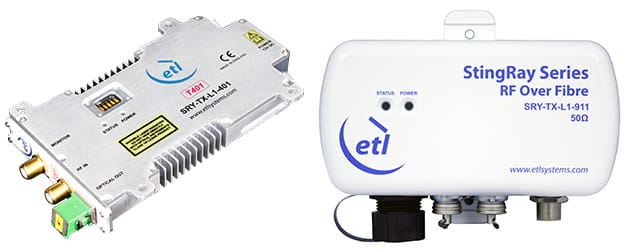
GENUS ODU Compatible
All of the above modules can be housed within the GENUS ODU (Outdoor Unit), providing a compact and efficient solution for various RF signal management needs. The GENUS ODU is designed to protect and operate RF matrices and routers in challenging outdoor environments, ensuring reliability and performance.
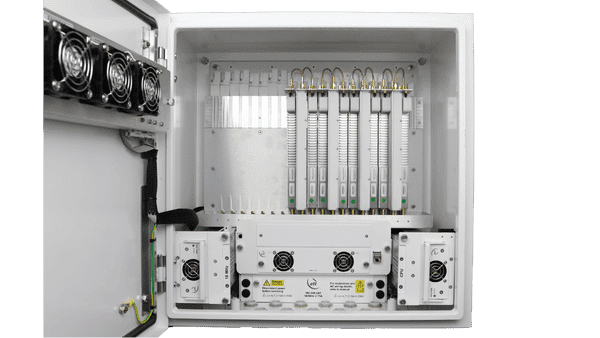
Case Study
SKY Perfect JSAT choose ETL Systems as its partner for antenna upgrade
SKY Perfect JSAT, Asia’s largest satellite operator, upgraded its JCSAT-1C satellite gateway with RF over Fibre capabilities. To achieve this, they partnered with ETL Systems and deployed their StingRay RF over Fibre product. This upgrade enhances communication services for their extensive subscriber base and infrastructure. Read more
FAQs
ETL’s RF Over Fibre modules convert radio frequency (RF) signals into optical signals for transmission over fibre optic cables. This process involves modulating an RF signal onto a light wave using a laser, transmitting it through fibre optic cables, and then demodulating it back to an RF signal at the receiving end. This method enables long-distance transmission with minimal signal loss and interference.
ETL’s RF Over Fibre modules provide several advantages over traditional coaxial cable systems, including:
Extended Range: Fibre optic cables can transmit signals over much longer distances without significant signal loss.
Lower Attenuation: Fibre optics have lower signal attenuation, ensuring better signal quality over long distances.
Immunity to EMI/RFI: Fibre optics are immune to electromagnetic interference (EMI) and radio frequency interference (RFI), making them ideal for environments with high levels of electrical noise.
Reduced Weight and Size: Fibre optic cables are lighter and thinner than coaxial cables, making installation easier and less space-consuming.
ETL’s RF Over Fibre modules are designed to handle a wide range of RF signals, including those used in satellite communications, GPS/GNSS, broadcast, and military applications. They can accommodate frequencies from a few MHz up to several GHz, making them suitable for various applications that require high-fidelity signal transmission over long distances.
ETL’s RF Over Fibre modules ensure signal integrity through high-quality components and advanced design techniques. The use of low-noise lasers and photodetectors minimises signal distortion and noise. Additionally, the modules are designed to maintain linearity and minimise signal degradation, ensuring that the transmitted signal retains its quality and accuracy over long distances.
Yes, ETL’s RF Over Fibre modules are designed for versatility and can be used in both indoor and outdoor installations. They come in ruggedised enclosures that protect against environmental factors such as moisture, dust, and temperature extremes. This durability makes them suitable for a wide range of applications, including those in harsh or remote environments.

Get in touch
Whether you’re starting a new project or need expert guidance, we’re here to find the perfect solution for your needs. Reach out to us now and start the conversation!
